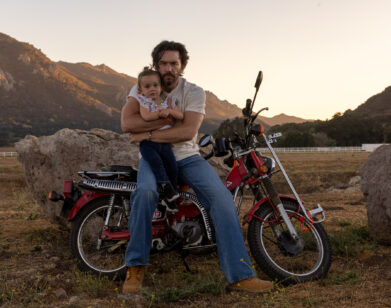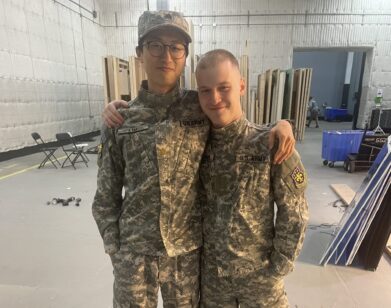Actors’ Actors Elisabeth Moss and Merritt Wever Geek Out on “Camera Stuff”
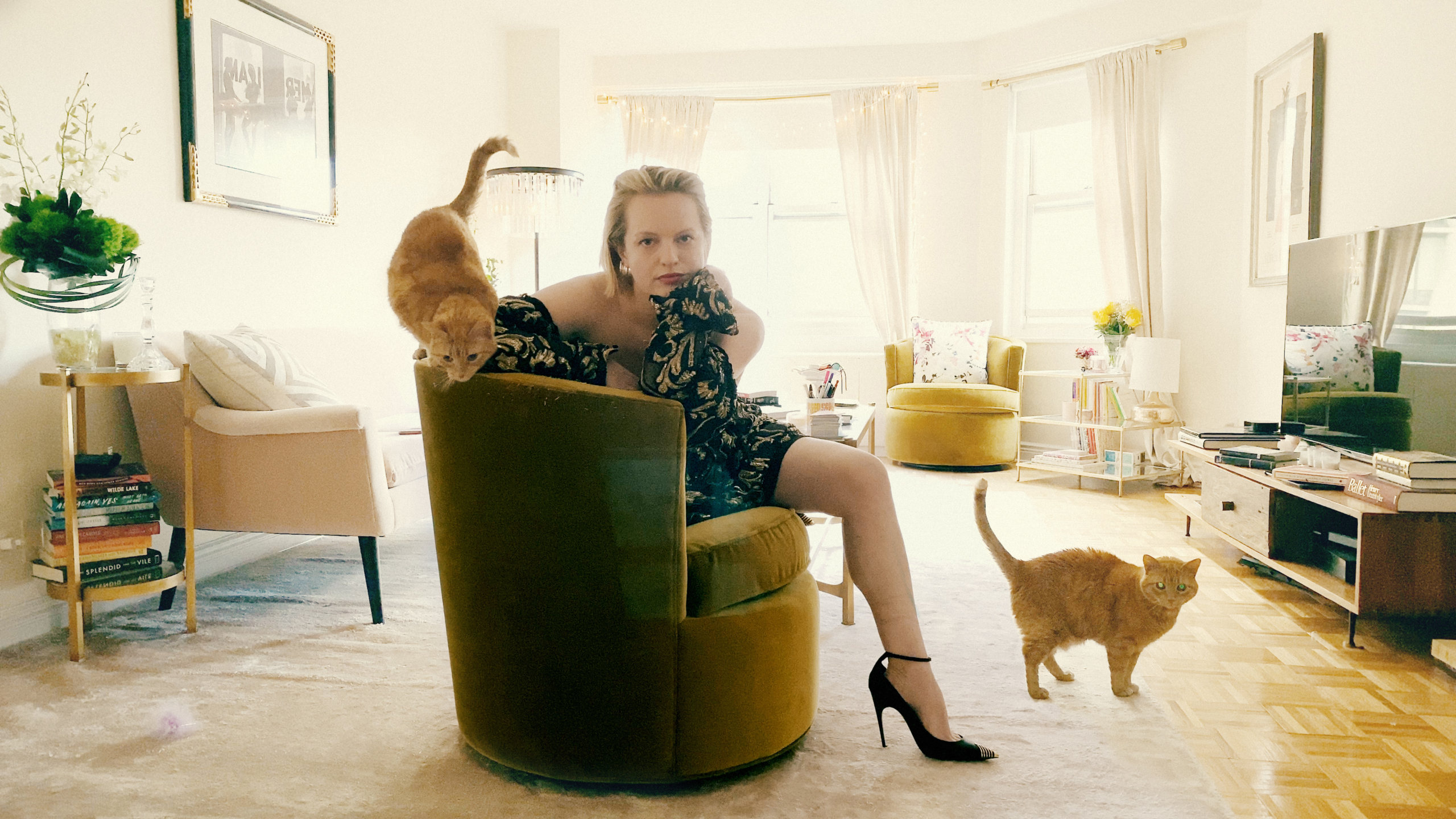
Dress and Shoes by SAINT LAURENT BY ANTHONY VACCARELLO
If you had to put money on which actor has an Oscar in their future, Elisabeth Moss is what oddsmakers might call a lock. Since her historic run on Mad Men ended five years ago, Moss has made fearlessness her trademark, spiraling downward into characters so flawed, fraught, and tormented that Stephen Colbert once challenged her to a cry-off, and an entire article was dedicated to her runny mascara. Already one of the most accomplished television actors of her time—she has six Emmy nominations for her role as Peggy Olsen on Mad Men, one for playing a traumatized detective on Top of the Lake, and another nomination and win for her work on The Handmaid’s Tale—Moss is rapidly building a movie resume that rivals her work on the small screen. Her collaborations with the director Alex Ross Perry, Queen of Earth and Her Smell, are the kinds of warts-and-all character studies that only a performer at the peak of their powers could pull off. Earlier this year, she brought a blunt-force realism to the role of an abused woman being stalked by her ex in the horror hit The Invisible Man, and is slated to appear this fall in Wes Anderson’s The French Dispatch.
Moss’s latest film, Shirley, is a psychological snapshot of the reclusive author Shirley Jackson as she begins work on her gothic novel Hangsaman. When Jackson and her husband Stanley (Michael Stuhlbarg) welcome a young couple into their home, the film, directed by Josephine Decker, becomes less of a traditional biopic and more of a twisted relationship psychodrama, with Moss proving once again that no one can radiate inner turmoil quite like her. But as skilled as Moss is, confidence, she tells fellow television queen Merritt Wever, can be hard to come by.
———
ELISABETH MOSS: How are you?
MERRITT WEVER: I’m okay. It’s an honor to be asked to do this. I fucking loved Shirley. I haven’t really been able to watch things for the last seven weeks. And so, in a way, it was good to have this assignment, because it forced me to sit down. I loved getting to revisit the experience of watching a movie again and I loved this movie, and I loved, in particular, my experience of watching this movie. One of the things I realized I’m hitting up against in talking to you is that I wouldn’t want to rob anyone else who sees this film of their own exciting and delicious experience of watching it.
MOSS: That’s so incredibly nice of you. And I know what you mean. I’m the same way. I never want to spoil anything for anyone. I never want to tell anybody about anything. I’m always just like, “Just go watch it.” I’m sure everyone would laugh if we just never spoke about Shirley and only talked about other things.
WEVER: It’s one of the problems I run up against in press, in general. I often don’t want to spell it out for people and rob them of their own engagement.
MOSS: I’m the same way. And then we just end up sitting and staring at each other, because I refuse to talk about it.
WEVER: What point in the press process are you at with Shirley? I know that you went to Sundance with it, so I assume you started talking about it and receiving people’s responses to it then. But I’m curious if this is one of your first conversations, or if you’ve already learned how to talk about this movie?
MOSS: That’s a question that only another actor who has been through this experience would ever ask.
WEVER: Oh, no.
MOSS: No, it’s so great. That’s why this Interview magazine process is so interesting, because you get these questions that are really inside baseball.
WEVER: It’s also potentially exposing, which is terrifying to me.
MOSS: We did take it to Sundance, but technically, this is the first interview I’ve really done for it since then, so you’ll either get confusing answers, or it’ll be really fresh and interesting.
WEVER: I’m so clumsy when it comes to being responsible for driving a conversation. I’ve never done this before.
MOSS: I did it with Michelle Dockery, and I was in your position. I remember just being like, “I have such a newfound respect for journalists.” I found it so hard to listen to the other person and then come up with my next question. I was like, “How do they do this?”
WEVER: It’s terrible.
MOSS: I know exactly what this feels like, so don’t worry, I got you.
WEVER: You’re going to hear lots of rustling of papers and attempts to read my own notes. How do you feel about learning how to talk about a project?
MOSS: When you’re doing press for something, there’s your experience of the project, there’s the movie that you read, there’s the movie that you made, and then there’s the perception of it. So I always try to speak from my perspective as much as possible, as opposed to any objective viewpoint of it. We’ve been really lucky in the sense we got a lot of great reviews. But it’s always interesting to hear, “Oh, we thought this about that.” And you’re like, “Oh, I never thought about that.” Or like, “This means this.” And you’re like, “Oh yeah, I guess it does.”
WEVER: What is your relationship to reviews and reading them and how they hit you? Or maybe I can rephrase that.
MOSS: It’s a great question, Merritt. Really good job.
WEVER:You’re having to totally caretake me. This is terrible!
MOSS: It’s totally fine. I love it. I would say that my relationship to reviews is as complicated as you might imagine. We all do the thing where we believe the good ones and think the bad ones are wrong. When something is just coming out, I try to avoid them for self-preservation. But what will happen inevitably is you kind of get an idea. And either people start sending them to you because they’re good, or no one sends anything to you because they’re not good. I’m not going to lie to you and be like, “I never read them.” But when you’re a producer on something, you have this other vested interest in it, so you’re not just protecting and preserving yourself as an actor, you actually care about whether or not anybody liked the movie, because you want to sell it.
WEVER: I’m so curious about your experience as a producer. How has it affected you as an actor?
MOSS: My first experience with it was this film I did called Queen of Earth, with Alex Ross Perry, and it was so interesting, because I didn’t intend to be a producer. He sent me the script, I loved it, and we started casting it. And then we started talking about locations, and we started talking about this, that, and the other thing. And then all of a sudden, there was a point where I was like, “Oh, I guess this is producing. I guess I’m a producer on this.” From then on, I got kind of addicted to it. I would have thought that maybe it was going to be something that would have distracted me from the acting part, but what I found so quickly is that my understanding of the material was so much deeper: “I know why we’re shooting at this location. I know why we’re shooting this on this day. I know why that actor was hired. I know why that character’s wearing what they’re wearing.” In order to make those decisions, you have to think about it. So all of a sudden you’re thinking about other characters in a way that you may not have thought about them.
WEVER: That’s so fascinating to me.
MOSS: I’ve always been that person who is standing next to the camera and asking what that button does.
WEVER: You’ve been doing this since you were so young, too. I always wonder if people who have had it as a presence in their life from such an early age are somehow more interested in the technical aspect.
MOSS: Learning about things that are not necessarily part of my lane is a way for me to continue to be interested in what I do, and to expand my overall knowledge of this business and filmmaking. It’s a way for me to remain in an explorative space. I love the idea of constantly learning about this shit.
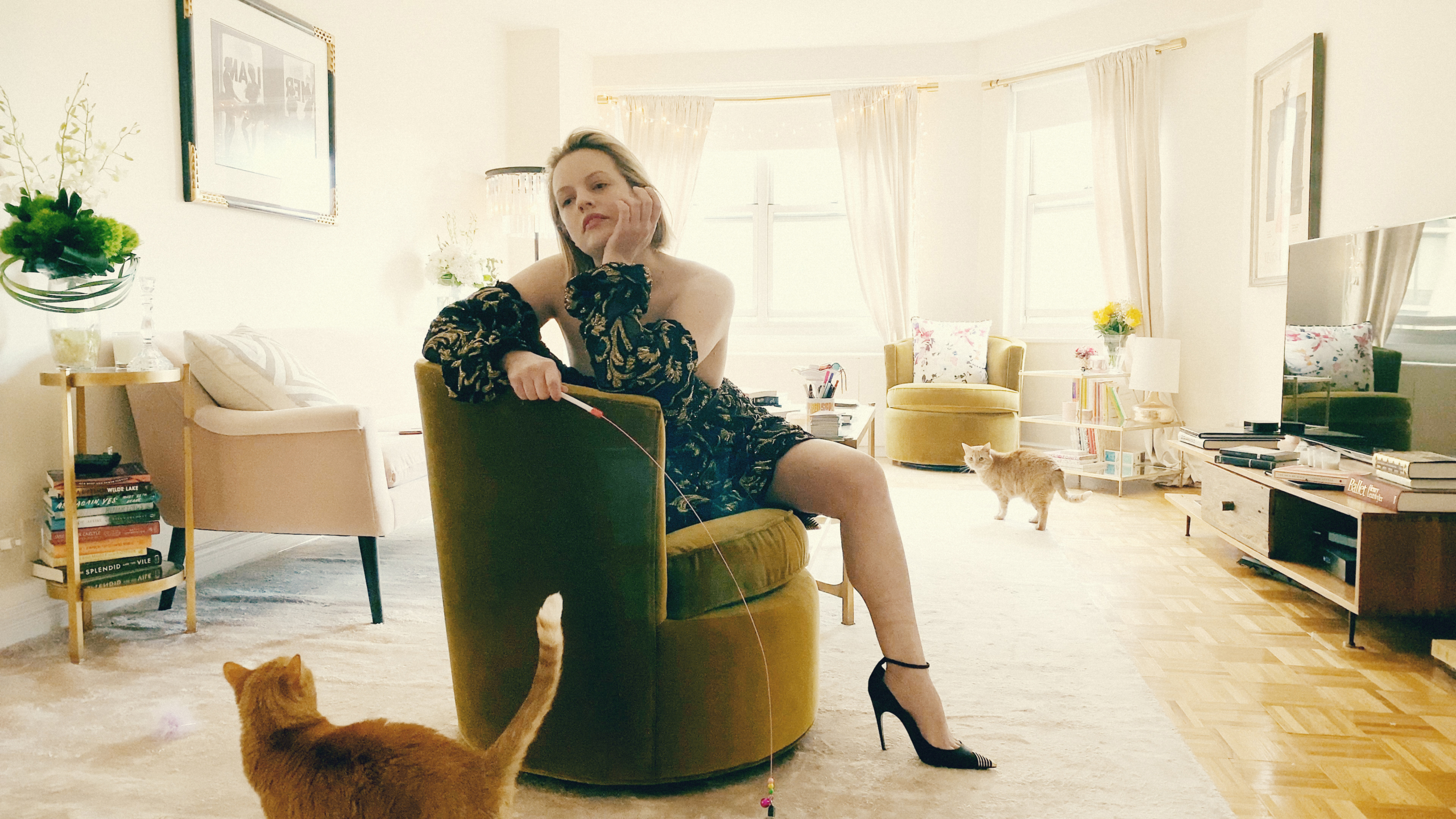
Dress and Shoes by SAINT LAURENT BY ANTHONY VACCARELLO
WEVER: I find myself craving more lately, and I’m just not sure what that more is.
MOSS: Not to tell you what’s happening with your life, but obviously you’re moving into a place where you’re the woman who’s on the poster, and that puts you in a different place of wanting to have a little bit more responsibility and control. That’s a fantastic thing. It’s you they’re selling the shit on, so why shouldn’t you have a little bit more control?
WEVER: I hear you, Miss Moss.
MOSS: [Laughs] I’m going to ask you a question, Merritt Weaver.
WEVER: Oh, shit.
MOSS: Yeah, because this is Interview magazine, and we can go both ways. Are you somebody who can watch yourself?
WEVER: Not really. But as you talked about, once you start carrying more responsibility within a project, you start needing to be aware of more things. I’m realizing that I need to expand my old ways of doing things a little. I wonder if there’s a way to use it to feed my work. But I’m also scared. If I change it up, will I screw everything up?
MOSS: I totally get that.
WEVER: Even with reading reviews, it’s different when you’re reading about something that’s a one-off than it is when you’re taking in everybody’s opinion about something that you’re going to return to for another season. Then you start to worry, “Will I suddenly be seeing her from the outside?” I’m not really an outside-in actor, and getting in my head tends to be the death of me.
MOSS: It would be like if you were in the middle of making a movie, and then you read reviews of the week’s work. It would be terrible. I avoid The Handmaid’s Tale reviews for that reason, because I’m still playing the character. What if you read, “Elisabeth Moss does this with her eyeball”? And you’re like, “Do I do that with my eyeball?”
WEVER: Okay, I’m doing that thing where I’m looking at my notes.
MOSS: Take your time. I’m here to support you in this process.
WEVER: I do want to touch more on Shirley, because I loved it so much. It’s a deeply carnal film. It’s married to this thing that’s a very internal process, something that happens within somebody—in somebody’s mind, in somebody’s heart—that occurs between them and the page.
MOSS: It’s so interesting you say that, because I remember really early on saying to our writer, Sarah Gubbins, “To me, this is a movie about the writing process.” I know it’s about Shirley, I know it’s about the marriage—I get that. But to me, it’s also about the incredible and maddening experience of writing something.
WEVER: It’s one of best final six minutes of a movie that I’ve seen in recent years. I’ve had a hard time entering into any narrative other than the news, and I just remember finishing this film and being so grateful and satisfied, because in addition to being about a lot of other things, it’s about the fucking creative process! And I’m always interested in how other people survive being a person and being an artist.
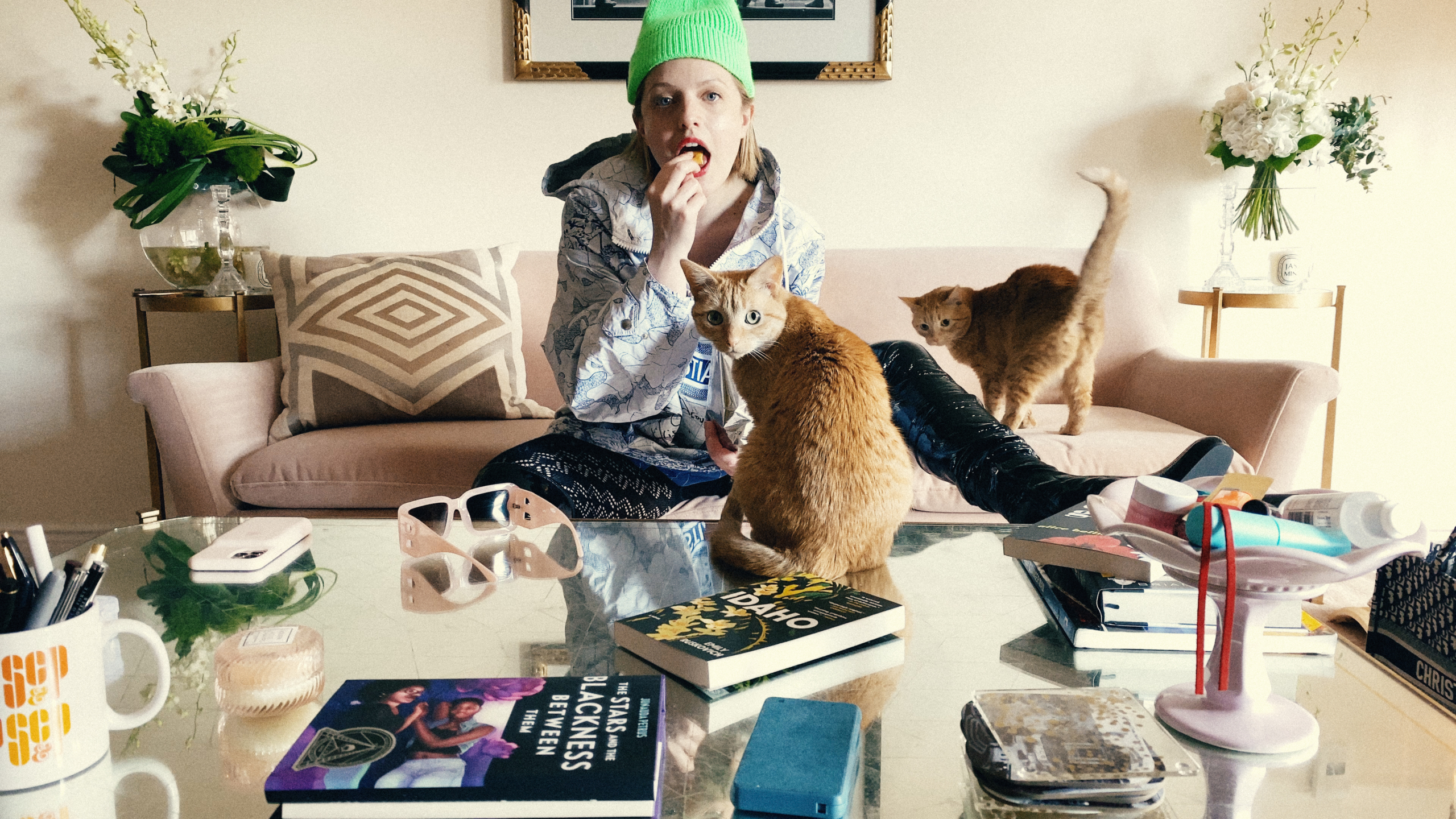
Jacket by DIOR. Hat by MARCELO BURLON COUNTY OF MILAN. Tights by MIU MIU. Sunglasses (on table) by BURBERRY. Shoes by PRADA.
MOSS: I completely agree. To me, that final scene, what I was trying to do was boil the entire experience down to this one moment where you have sat in a room by yourself, and you have put your blood, sweat, and tears into a piece of writing, and you’ve exposed yourself in the most vulnerable way. You’ve spent time on it, you’ve judged it, and you’ve loved certain parts of it and hated other parts of it. And now she’s giving this piece over to the person that she cares the most about. It’s that incredibly lonely place where you’re like, “I hope he likes it. And if he doesn’t like it, I will literally die.”
WEVER: How did you feel when you got home that night?
MOSS: I did the classic actor thing. I don’t know anyone who doesn’t do this, and I don’t believe them if they say they don’t. I left and went, “I should’ve done this, I should’ve done that.” Then the next day you wake up and you’re like, “Fuck. I definitely could have done it better, or, like, 10 more times. But it is what it is.” Have you heard that thing about there being three versions of a scene for an actor?
WEVER: No.
MOSS: There’s the version you do in your car on the way to work. There’s the version you shoot. And there’s the version you do in the car on the way home.
WEVER: I’m familiar with the one that you do on the way home, or the one that once you see the whole project, you’re like, “Oh, that’s what was happening.” That’s the worst feeling.
MOSS: Totally. I find that my judgment of what is the best acting version for myself, is….
WEVER: Off?
MOSS: Yeah! Sometimes you see something and you’re like, “That was fucking awesome.” But I find most of the time, the scene that you thought you fucking crushed is not the best scene. And then the one that you were so-so about is really good.
WEVER: I’ve had many experiences where I’ll be doing a play and I’ll come offstage, and I’ll be like, “That was the fucking worst one I’ve ever done.” And the director will get in there that night and be like, “That was your best performance.” It would send me down such a rabbit hole.
MOSS: That very thing has happened to me in theater so many times. I’m more comfortable in film and TV than I am in theater. Are you more skewed to one or the other?
WEVER: In recent years, I’ve done more stuff with camera—I was going to say “camerawork,” but that sounds ridiculous and snobby. But if I said “camera stuff,” that would sound more proletariat of me. But “camera stuff” doesn’t sound like acting.
MOSS: Let’s call it “lens-emoting.”
WEVER: “Lenscraft.” I’ve been working in film and television more in recent years. So, in this very moment, although it’s not like I’m ever confident when I go to work, I would say that I’m a lenscrafter.
MOSS: You work at LensCrafters.
WEVER: There’s something comforting about knowing those precious moments when you do feel like you get it, that it’s been captured and that it can live somewhere. I would have a really good night onstage, and then I would just be heartbroken that it couldn’t exist like that again. But that’s the work of being onstage. It’s doing the same journey anew every night and finding ways to relive it. But I’ve always found something somehow devastating about it.
MOSS: I think you’re one of the great actors. One of the things that’s so interesting about what you do is you have a command of the close-up and what’s happening in your eyes. And then at the same time, you have a physical consciousness as well, which probably comes from your theater background. You seem completely aware of your whole body and what it can do and how it can communicate something—whether it’s tension or awkwardness or confidence.
WEVER: Thank you so much for that.
MOSS: I hope I didn’t just mess up your entire process and now you’re going to be stiff as a board.
WEVER: I could have been something one day, but then Elisabeth Moss called in a motherfucking favor.
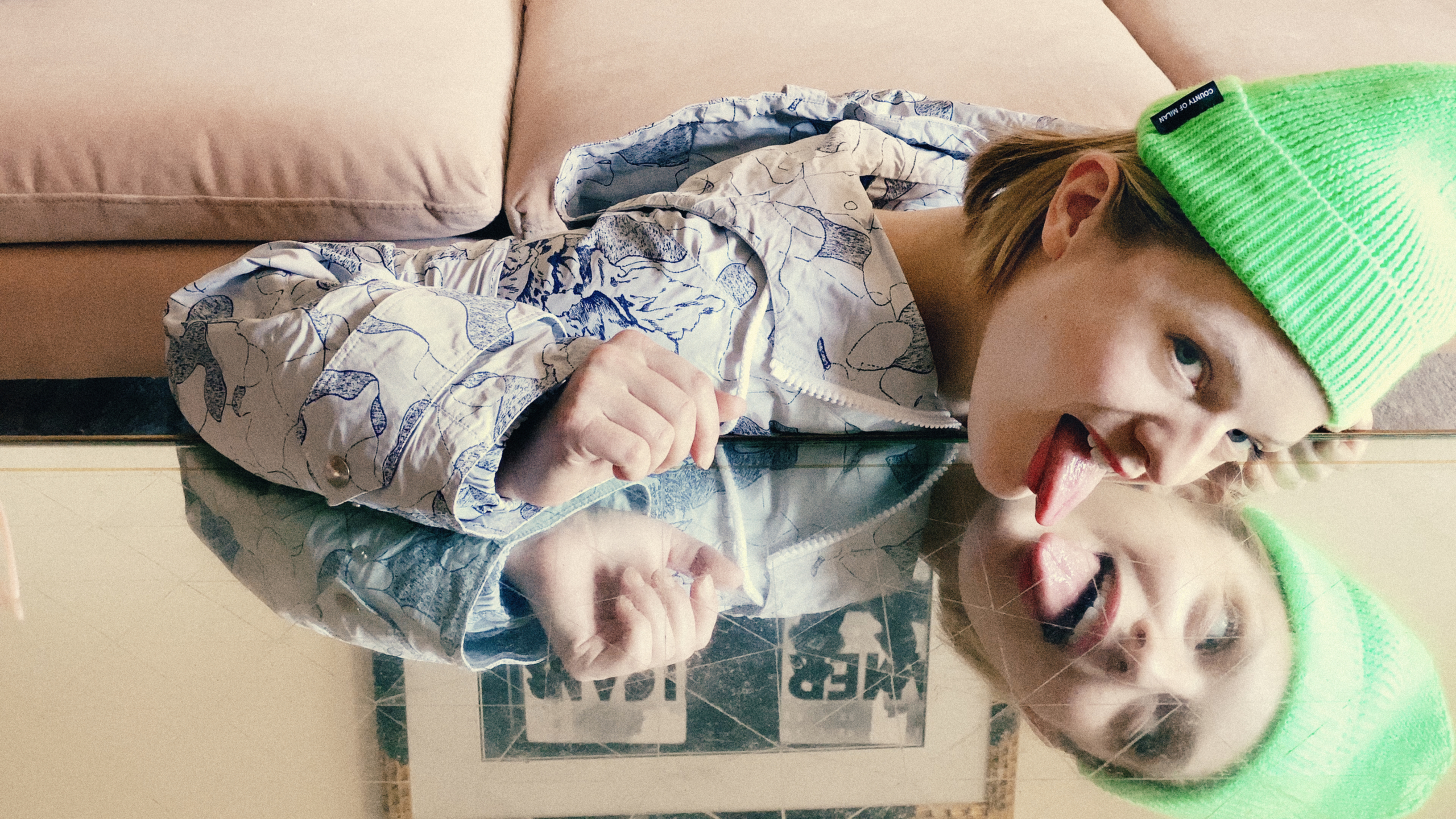
Jacket by DIOR. Hat by MARCELO BURLON COUNTY OF MILAN.
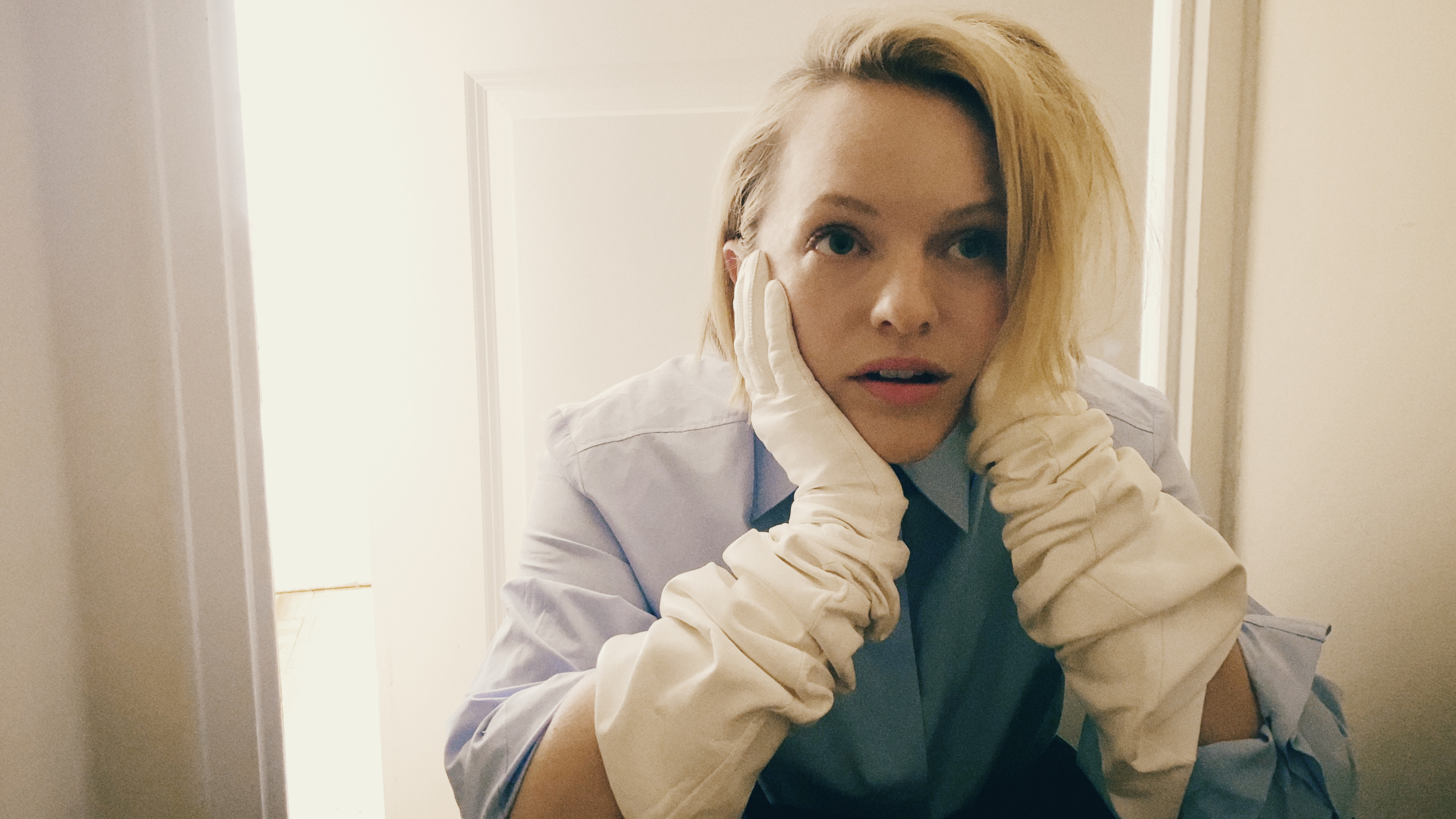
Shirt by GIVENCHY. Vintage Gloves STYLIST’S OWN.
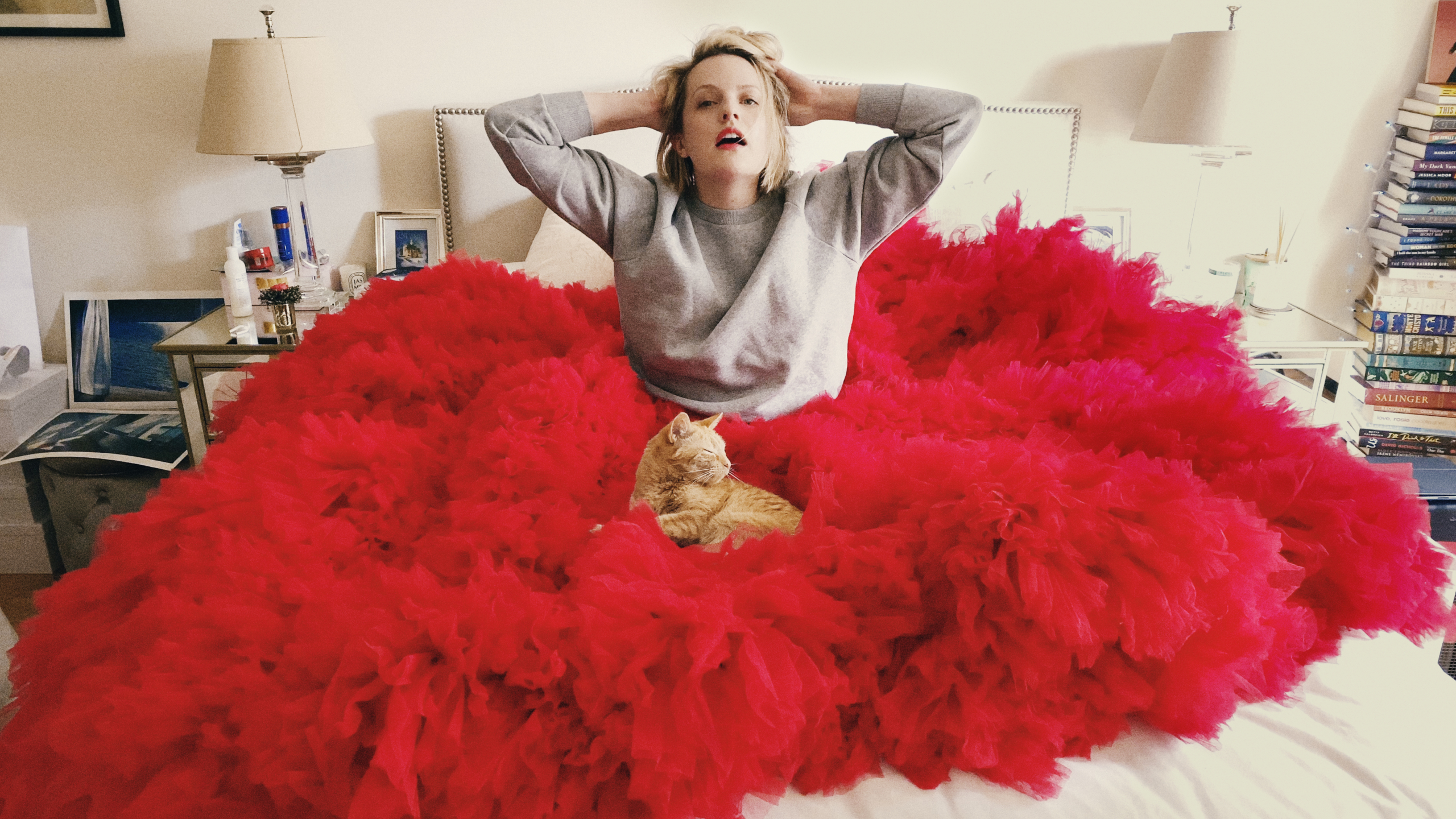
Shirt by X KARLA. Skirt by CHRISTIAN SIRIANO.
Production: AMANDA PRUNESTI
Digital Technician: BAILEY DALE
Photography Assistant: TREY BADAMI





